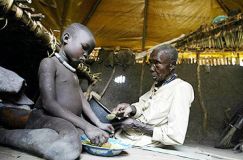Peace poses fresh challenges for Sudan SPLM
Oct 3, 2005 (MAUL Camp, South Sudan) — A definitive peace deal with Khartoum ending 21 years of civil war poses new challenges to ex-southern rebels as they adjust to peace with formal military training, education and plenty of free time.
 After a routine morning drill at Malu Camp near the autonomous south’s provisional capital of Rumbek, nearly 6,000 Sudan People’s Liberation Movement/Army (SPLM/A) troops idle away their afternoons playing poker, meandering the streets in search of cigarettes and provisions in one of the world’s most deprived and war-ravaged regions.
After a routine morning drill at Malu Camp near the autonomous south’s provisional capital of Rumbek, nearly 6,000 Sudan People’s Liberation Movement/Army (SPLM/A) troops idle away their afternoons playing poker, meandering the streets in search of cigarettes and provisions in one of the world’s most deprived and war-ravaged regions.
Dozens have registered for language and arithmetic classes, readying for re-deployment to other parts of Sudan, under a clause in January peace deal will see SPLA troops join a joint army with Khartoum’s soldiers during a six-year transitional period.
Without books and pens, these aging pupils sit under a fig tree and recite the Dinka alphabet, the language of the tribe that contributed most fighters to SPLA.
Nearby, aid workers and traders reconstruct Rumbek, which, by and large, lies in ruins thanks to countless bombing raids, except for new airport built by the World Food Programme.
The only intact buildings are mud huts. Roads are still unpaved and potholed. Many teachers work for no pay.
“We have peace, the fighting is over,” said Mathew Mading, 64, an mathematics and language instructor. “We have to improve the education level of these people.”
Now that the work of implementing the peace deal is under way, with the latest step being the formation of a government of national unity, several ex-fighters are still dubious that Khartoum will respect the agreement.
“We are not sure whether Khartoum really wanted peace,” said former SPLA rebel James Puoc.
Safe drinking water and the most basic medical facilities are rare luxuries in most of the south, an oil-rich region that is largely by Christian and animist tribes.
“I wish for an equal sharing of resources between the north and the south,” said ex-fighter Daniel Riak Manyel. “I wish for the development of southern Sudan, like the construction of schools, roads, and health facilities.”
Such discrepancies with the wealthier and Arabised north have apparently made southerners doubt whether a united Sudan is attractive ahead of a referendum on self-determination scheduled for 2011.
“Six years is very long,” said Manyel, a junior officer in the 30,000-strong SPLA army who said most people he knew would decide whether to vote for secession based on how Khartoum deals with the autonomous south.
“It depends on our experience of this peace,” he said.
Despite being keen for a slice of the peace cake.
Malu Camp Commander General Santo Ayang Deng says he believes the peace deal will hold.
“We do not have fears,” he said, reclining in his office, boots propped alongside his radio. “We signed for peace and I believe in this government of national unity.”
As others did, he lamented the lack of resources plagueing his forces: inadequate accomodations and food, in addition to a scarcity of medicine and uniforms.
Deng hopes that 1.5 billion dollars annually allocated to the south under a wealth-sharing provision in the peace deal will go a long way to boost his small camp and other similar facilities across the region.
But in addition to the cash, his ex-fighters need an education, he added.
“It is necessary that these soldiers attend school to adapt to modern life.”
(AFP/ST)
